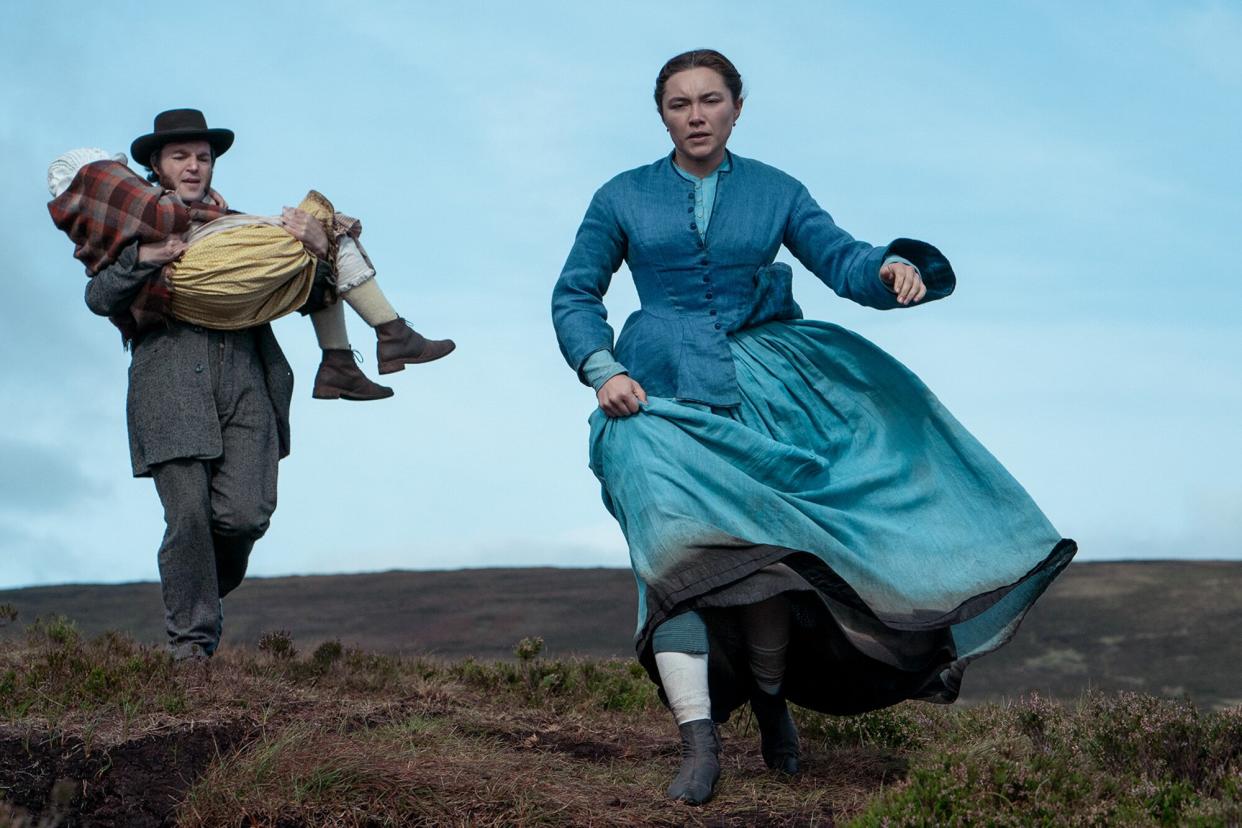The Wonder review: An atmospheric tale of faith versus medicine

"Anna O'Donnell doesn't eat." That's all a nurse named Elizabeth Wright (Florence Pugh) has been told — not that her medical training allows her to believe it for a moment — and why she's been summoned from London to a remote village in Ireland in Sebastián Lelio's moody, cloistered drama (in limited release now, and on Netflix Nov. 16).
It's 1862, not far out from the Great Famine, and the sight of a British citizen in any kind of uniform is still not particularly welcome by the locals. The feeling is mutual: Elizabeth, or Lib, as she eventually allows her young patient to call her, doesn't know why she's been brought to this impoverished backwater for a case that clearly seems to be based on faith, not science, or whether it's even worth trying to assert her expertise in a place where a woman's word is hardly taken more seriously than a dog's.
But still she agrees to observe 11-year-old Anna (Kíla Lord Cassidy) for two weeks without interfering, splitting shifts with a nearly silent nun brought in to share the duties (Why a nun? Lib asks; "Welcome to Ireland," comes the wry reply). And Anna seems like a sweet girl, if an unusually devout one; she survives, she promises Lib beatifically, on "manna from heaven," more soul-filling than any earthly sustenance. That's impossible, of course, though the panel of local (and naturally all-male) grandees in charge of the investigation, including an officious doctor (Toby Jones) and the O'Donnell's solemn parish priest (an underused Ciarán Hinds), each have their own more or less ridiculous theories.

Aidan Monaghan/Netflix
The longer Lib spends circling the girl's secret, the further she feels from the source, though she finds that hard to convey to the journalist at her boarding house who's also come up from London determined to ferret out the truth, a rakish disbeliever named William Byrne (The Souvenir's Tom Burke, whose character seems to be the only one halfway enjoying himself in this town.) To the villagers who come to pay tribute, or merely bask in the presence of a sanctified child who appears to have her own direct line to God, Anna is "a jewel, a wonder"; to William, she's a "wee faker."
For Lib, she's a puzzle to be solved and then slowly, an object of real sympathy. Maybe that has something to do with her own pain; in public, she's brusque and guarded, but alone in her room at night, the woman who has ensured her hosts that she's a childless widow enacts a strange ritual, one that involves the careful, almost sacred placement of a little pair of knitted baby booties and a spoonful of some heavy syrup (laudanum? heroin?) that makes her swoon.
There have been numerous books and think pieces about the 19th-century phenomenon of so-called "fasting girls" — mostly adolescents caught up in a religious fervor, or more likely, merely chafing at the narrow confines of their Victorian lives. Novelist Emma Donoghue (Room) based her 2016 novel The Wonder on one of those stories, and its subject matter seems like ripe fodder for Lelio, the Oscar-winning Chilean auteur whose gift for inhabiting the female gaze was crystallized in films like Gloria, A Fantastic Woman, and Disobedience. The sumptuous cinematography, by Ari Wegner (The Power of the Dog, Zola), makes the landscape look like a Brönte novel, full of windswept moors and flickering, fire-lit shadows. Pugh, too, is pretty much perfectly cast, an actress with such a keen emotional presence that she tends to cut through pretense and triviality like a hot knife.
The script, though, feels both less bold and less fully formed than its central star's performance, and Lelio chooses for reasons unknown to frame it all through a meta modern lens — bookending the movie with a self-conscious narration about "telling stories" and pulling back to reveal the studio set, with all its scaffolding and wires and backlot detritus. It's an odd choice (aren't all movies stories?) and not a particularly organic one for a filmmaker whose vision with his own material has been so distinct and intimate. Instead, Wonder's spare, muted intrigue hangs mostly on Pugh and atmosphere, an elusive minor-key mystery. Grade: B
Related content:

 Yahoo News
Yahoo News 
